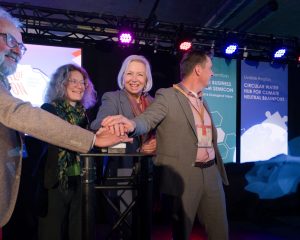Remote working and online conferencing: the corona impact on Smart Mobility
“The project is fine,” says Gijs Dubbelman, Assistant Professor in EE-SPS’s Mobile Perception Systems Lab at TU/e. “Everyone is on track and no delay is expected. However, far fewer demos could be done than planned, so the valorization side is leading. Because of the coronavirus, there’s a (good!) focus on research.” He’s referring to the Smart Mobility project of Eindhoven Engine, in which co-located PhD students work alongside semiconductor
giant NXP on Deep Learning for Embedded Automotive Platforms and Spread-spectrum Modulated And interfeRence resilienT RADAR. Although the coronavirus has hampered much of global work and education, projects like this show the resilience of research in Eindhoven.

“Everyone is on track and no delay is expected. Because of the coronavirus, there’s a (good!) focus on research.”
Gijs Dubbelman, TU/e professor
Creative planning
Daan de Geus, a PhD student within the project, has been pleasantly surprised by the ease with which some aspects of the research can be done remotely. “I’m researching scene understanding algorithms for self-driving vehicles and robots, which they can use to gain situational awareness, and I’ve developed a method which is both very accurate and efficient,” he explains. “In principle, I can do almost everything remotely, so not a lot has changed. Working from home is different as I’m a little less productive, but – in general – it’s going quite well.”
For Daan, the main difference arises in communication with fellow PhD students and the students he supervises. “Normally, we’re in the same room and you can ask any questions and brainstorm together. You can’t do that as quickly through Skype or Teams. For undergraduate and master’s students, there’s also normally more face-to-face communication and it’s easier to help them when they’re stuck. It forces you to be creative and work more systematically: I now have dedicated days where I just focus on meetings, interactions with students or my research. I’m a lot more conscious of how I divide my time.”
Ups and downs
n spite of the pandemic, academia and industry keep moving forwards. This year’s International Conference on Robotics and Automation, for instance, moved from Paris to a prerecorded, online environment – including Daan’s presentation of his research. “The upside is that I didn’t have to choose which sessions or workshops to attend as everything is available,” he notes. “One additional plus is that it forces you to be much more conscious of what you’re explaining during your presentation. You might normally do it on the fly but now you really have to explain everything within ten minutes without questions afterwards. The downside is the social aspect, where you get the more creative discussions and ideas with your peers. That’s definitely what I missed the most.” With any luck, next year’s conference will have a physical space for the Smart Mobility project to share even more of their successes.

“It forces you to be creative and work more
systematically. I’m a lot more conscious of
how I divide my time.”
Daan de Geus. TU/e PhD student
